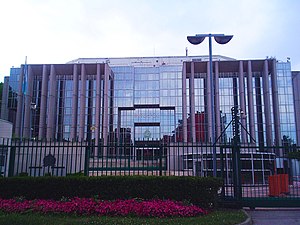Terraconserva International Court
| Terraconserva International Court | |
|---|---|
 The Headquarters building shared by the TIC and by TERRAPOL. | |
| Established | 2020 |
| Jurisdiction | International waters, the Terraconserva Council of Nations Headquarters, violations of international law |
| Location | Bostonia, Quebecshire |
| Authorized by | Statutory |
| Judge term length | 3 years |
| Number of positions | 14 seats |
The Terraconserva International Court is the judicial arm of the Terraconserva Council of Nations established in 2020. Since its inception it has overseen numerous trials including the criminal trial of the serial killer known as The Phantom whose crimes transcended national borders and the trial of Ajaki dictator Vladimir Kariev for crimes against peace.
History
The Terraconserva International Court was created on the authority of the TCN following the passage of TCN Resolution 026. The court was given room in a large TCN building which soon was also authorized to house the organization TERRAPOL the police cooperative of the TCN. The court has overseen several trials since then.
Facilities
The TIC building is owned by the Terraconservan Council of Nations and it share office space in the building with the organization TERRAPOL. The part of the building assigned to the court has numerous courtrooms including a large appellate courtroom where the entire court may be in session to discuss issue such as international lawsuits.
Smaller courtrooms have seating set aside for judges and defendants. For security purposes and to reduce the risk of transferring detainees from one location to another, a set of secure dormitories were built to provide secure housing for detainees during their pre-trial, trial, and brief post-trial stays.
Procedures
Per TCN Resolution 027 a criminal trial may be called by means of a letter of invocation submitted to the court, asking them to take on a particular case. The court may also of its own accord investigate and prosecute crimes that take place in international space such as on ships at sea or within the TCN property, and may prosecute violations of international law it uncovers.
Criminal trials brought before the TIC follow lengthy procedures to ensure fairness to the defendant. The defendant must have counsel and a pre-trial hearing is always held to hear motions and to determine if their is sufficient evidence for a prosecution. Prosecutors are employed by the court but may also be provided to the court on rotation from the nation invoking the criminal charges.
Criminal trials are generally overseen by a panel of judges from neutral nations to the ones in dispute or the ones invoking a trial. Panels consist of three, or seven judges. Motion hearings, preliminary hearings, and minor legal matters may be overseen by a single judge.
Once convicted and sentenced the defendant will either be remanded to the custody of the authorities in their home country or to the custody of the aggrieved country to serve their sentence. The court will not retain custody of the defendant post-conviction unless they have filed an appeal and will transfer custody as soon as the appeal is heard and decided upon.
An appeal of a verdict must be heard by a panel of seven judges, none of whom can have been involved in the original trial.

